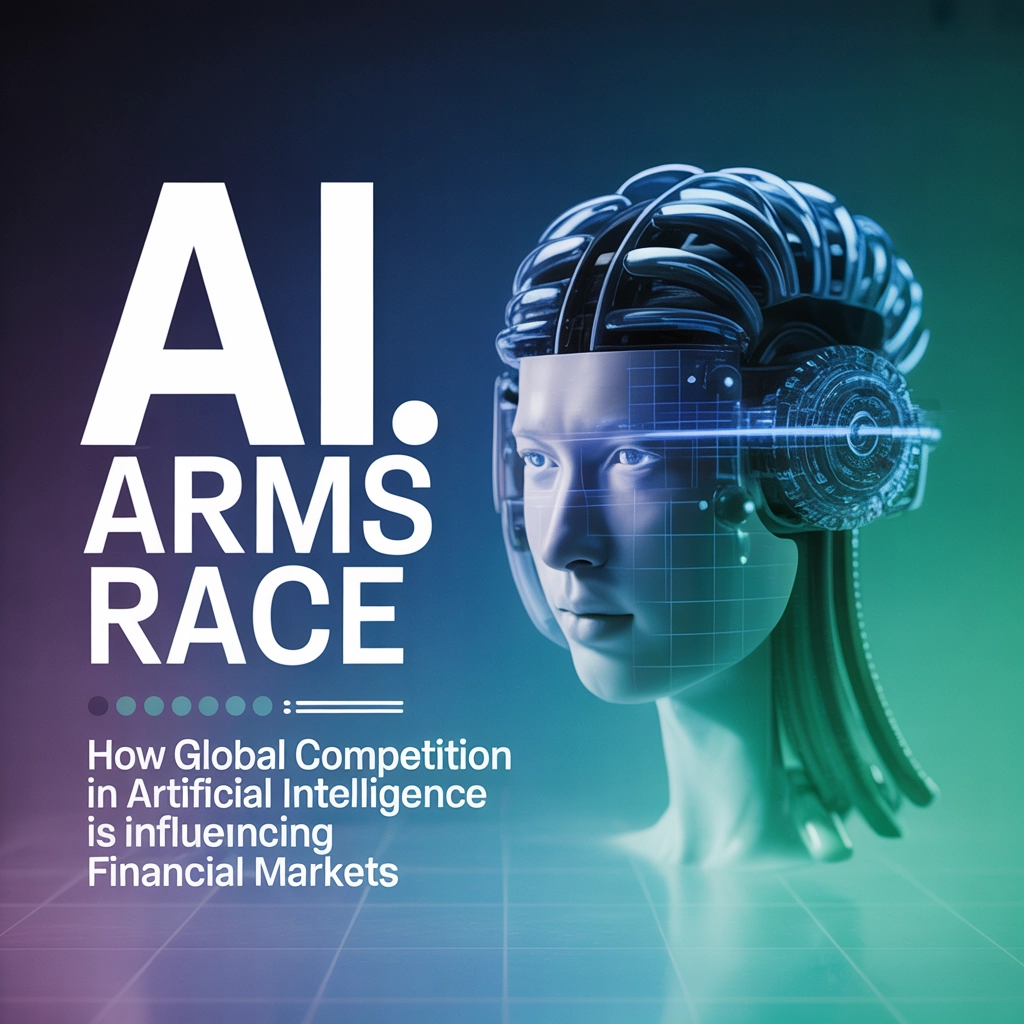AI Arms Race: How Global Competition in Artificial Intelligence Is Influencing Financial Markets

The New Global Battlefield
The race for AI dominance has emerged as perhaps the most consequential technological competition of our generation. Unlike the space race or nuclear arms race of the 20th century, the AI arms race lacks a clear finish line—there's no moon landing or warhead count to measure success. Instead, nations and corporations are pouring unprecedented resources into a technology that's reshaping everything from manufacturing to medicine, with financial markets experiencing some of the most dramatic impacts.
As managing director at We R Available, I've observed firsthand how this technological competition is creating both volatility and opportunity in financial markets. This isn't just about tech stocks anymore—AI's influence now extends to every sector, from real estate valuations to lending practices.
The Trillion-Dollar Government Gambit
Governments worldwide recognize AI as critical to national security and economic competitiveness, leading to massive public investments that are reshaping capital flows.
The United States has responded to perceived challenges from China with ambitious initiatives like the potential $500 billion "Stargate" project, aimed at securing American dominance in advanced AI capabilities. Similarly, the UK government has committed £14 billion toward AI research and infrastructure development, creating ripple effects through bond markets and public sector investment opportunities.
"The AI arms race between nations isn't just about technology—it's fundamentally reshaping government spending priorities, creating entirely new investment categories, and influencing monetary policy," notes Dr. Martin Chen, Chief Economist at the Global Financial Institute.
China, meanwhile, allocates over $1.6 billion annually specifically to military AI applications, but its true investment is much larger when considering civilian-military fusion strategies. Unlike traditional military procurement, China sources cutting-edge AI capabilities primarily from private startups rather than state-owned enterprises—creating a unique market dynamic that's attracting investor attention.

Corporate Champions: The Private Sector Battlefield
While governments set the strategic direction, corporations are the tactical leaders in the AI race, with their fortunes dramatically influencing financial markets:
- Nvidia: Perhaps the most visible beneficiary, Nvidia's stock has surged from roughly $30 to over $130 in three years as demand for AI chips exploded
- Microsoft/OpenAI: Microsoft's strategic partnership and $13 billion investment in OpenAI has bolstered its market position and stock performance
- Google/DeepMind: Alphabet's AI research division continues to influence the parent company's valuation
- Startups: AI-focused startups raised over $40 billion in 2024 alone, reshaping venture capital allocation
For investors, picking winners in this space has become crucial, creating both opportunities and risks. The concentration of market gains in AI-focused companies has led to concerns about market fragility and potential bubble dynamics.
Market Mechanisms Transformed
Beyond stock valuations, AI is fundamentally changing how financial markets operate. Algorithmic trading—already representing over 60% of trading volume in major markets—is becoming increasingly sophisticated through machine learning.
The International Monetary Fund reports that nonbank financial institutions (NBFIs), which now control over half of global financial assets, are deploying AI aggressively to gain competitive advantages. These institutions leverage AI for everything from risk assessment to client acquisition, challenging traditional banks' dominance in the financial ecosystem.
This shift creates several key impacts:
- Market volatility: AI-driven trading algorithms can create self-reinforcing market movements
- Concentration risk: As similar AI systems make similar decisions, markets become vulnerable to cascading failures
- Speed advantages: The firms with the most advanced AI gain microsecond advantages in trading
- Credit allocation: AI credit scoring is changing who gets loans and at what rates
For property investors and homebuyers—a core focus for us at We R Available —these changes affect everything from mortgage rates to property valuations. The algorithms determining loan approvals and property investment strategies are increasingly AI-driven, creating both opportunities and challenges.
Workforce Disruption and New Opportunities
Financial employment is experiencing significant transformation due to AI adoption:
- Job displacement: Routine analytical and customer service roles face automation
- New roles: Demand has exploded for AI specialists, data scientists, and AI ethics officers
- Skill premium: Compensation has increased dramatically for workers with AI expertise
- Geographic shifts: Financial centers are competing for AI talent, affecting commercial real estate markets

Geopolitical Dimensions: Values and Market Access
The AI race isn't just technological—it's ideological. Policy debates frame the competition as a choice between AI systems developed within democratic values versus state-controlled systems. This framing creates market implications as companies face pressure to align with particular national visions.
For investors, this introduces new dimensions of political risk. Companies may face:
- Export controls: Restrictions on selling AI technologies to certain countries
- Data governance requirements: Varying rules about data storage and processing
- Regulatory fragmentation: Different compliance standards across jurisdictions
- Market access challenges: Being forced to choose between operating in competing markets
These geopolitical tensions have real impacts on portfolio diversification strategies and market access. At We R Available , we're watching these developments closely to help our clients navigate the changing landscape of global investment opportunities.
Financial Infrastructure Transformation
Perhaps the most profound impact is on financial infrastructure itself. The IMF highlights how AI is enabling the rise of nonbank financial institutions that operate with fundamentally different business models than traditional banks.
Key trends include:
- Decentralized finance: AI-powered platforms offering banking services without traditional intermediaries
- Alternative credit scoring: Moving beyond traditional metrics to assess creditworthiness
- Personalized financial products: Tailored offerings based on individual behavior patterns
- Real-time risk assessment: Continuous evaluation rather than periodic reviews
"The AI arms race isn't just changing who wins in finance—it's changing what the game itself looks like," explains Sarah Johnson, Financial Technology Director at Digital Banking Associates.
For property markets specifically, AI is enabling new approaches to valuation, mortgage underwriting, and investment strategy. Investors who understand these changes gain significant advantages in timing market movements and identifying opportunities.

Investment Implications: Strategic Considerations
For investors navigating this landscape, several strategic considerations emerge:
- Exposure calibration: Determining appropriate exposure to AI-focused companies
- Sector impact assessment: Evaluating how AI will transform specific industries
- Geographic diversification: Balancing investments across competing AI ecosystems
- Time horizon management: Distinguishing between short-term hype and long-term transformation
The AI arms race creates both concentration risks and diversification opportunities. While a handful of tech giants currently dominate headlines, the technology's transformative potential extends to virtually every sector.
Looking Forward: What's Next?
As we move forward, several trends will likely shape the financial impact of the AI arms race:
- Regulatory evolution: New frameworks for AI governance will affect company valuations
- Technological breakthroughs: Quantum computing and neuromorphic chips could create new leaders
- Market maturation: As AI becomes standardized, competitive advantages may shift
- Geopolitical developments: Changes in U.S.-China relations will impact global AI investment flows
Conclusion: Navigating the New Landscape
The AI arms race represents both the greatest technological opportunity and challenge of our time. For financial markets, it's creating unprecedented change—transforming everything from stock valuations to trading mechanisms to credit allocation.
At We R Available , we're committed to helping our clients understand these changes and position themselves advantageously. Whether you're investing in property, managing retirement funds, or planning business expansion, understanding how the AI arms race affects financial markets is now essential to financial success.
The winners in this new landscape won't necessarily be those with the most advanced technology, but those who best understand how to integrate these advances into sound financial strategy. As the race accelerates, staying informed and adaptable will be the true competitive advantage.









